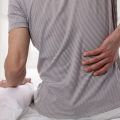Fibroid Pain Types and Treatment Options

Uterine fibroid discomfort is caused by non-cancerous tumors that form in the uterus. The growths can vary in size and produce a variety of uncomfortable symptoms.
Uterine fibroids are prevalent. Less than half of the 26 million Americans with uterine fibroids may be unaware of their condition since they are asymptomatic.
However, because of the difficult and often unpleasant symptoms they cause, more than half of those with fibroids are aware of them.
Pain is one of the most common symptoms of fibroids. However, the pain caused by uterine fibroids can appear in a variety of ways, ranging from mild pressure to intense pain to period-like cramping, making it difficult to identify or separate from other disorders that cause similar types of discomfort.
To assist you in identifying uterine fibroid-related pain, below are all of the possible causes and what you may do to relieve them.
Types of Uterine Fibroid Pain
There are different ways you can experience the pain associated with uterine fibroids.
Pelvic Pain
Pelvic pain is one of the most common symptoms of uterine fibroids. You may also experience dull pressure in your pelvis or spreading discomfort throughout your body.
Fibroids are frequently connected with pelvic pressure sensations; however, if a fibroid is large enough to encroach on other organs, you may have pain elsewhere.
Lower Back Pain
Depending on their size and location, some fibroids can cause pain in the lower back and legs. This is due to their effects on other organs; when fibroids become large enough, they can compress nerves down the spine, resulting in back and leg pain.
Abdominal Pressure
A feeling of fullness or pressure in the abdomen is a common symptom of fibroids, especially when they are large or numerous. Sharp, acute abdominal pain that does not go away with pain medication is cause for alarm, and you should seek emergency treatment.
Pain During Intercourse
Fibroids may cause pain while having sex. They may also induce pain before and during your period, which may feel similar to menstrual cramping. If you have fibroids, the pain may stay longer or be more severe.
Rectal and Bladder Pressure
Fibroids can also cause discomfort in your bladder and rectum, depending on where they are located. As a result, you may suffer frequent urination or the sensation that you are unable to empty your bladder. There may also be issues with bowel motions, such as constipation or excessive straining.
Severe Fibroid Pain
While ordinary uterine fibroid discomfort can be quite unpleasant, severe or debilitating pain that persists may indicate that something else is wrong with your fibroids.
If you have a degenerating fibroid, which occurs when the active fibroid tissue begins to die from the inside out, the pain will be the greatest you've ever experienced. It's a terrible, stabbing sensation that will probably have you doubled over.
Fibroids deteriorate when they outgrow their blood supply, starving and eventually dying. These fibroids can dissolve on their own within a few days, but others require surgery.
Other Common Uterine Fibroid Symptoms and Complications
Other signs and complications of uterine fibroids are:
-
Heavy or severe menstrual bleeding
-
Enlargement of the lower abdomen
-
Difficulty conceiving or infertility
-
Complications of pregnancy and labor
Treatment
The fibroid pain relief options may vary greatly depending on their size and location, whether they cause symptoms, and whether they influence your fertility.
Surgery
If your fibroids are causing serious problems, there are surgical options to reduce or eliminate them. But, sadly, they frequently regenerate. The only method to eliminate the danger of fibroids is to undergo a hysterectomy, which is a medical operation that eliminates the uterus. In the United States, fibroids constitute the leading cause of hysterectomies.
Anti-inflammatory Pain Relievers
If you're only looking to manage your pain symptoms, you can try a few different approaches. If you have fibroids that cause occasional pain or discomfort, anti-inflammatory pain medicines such as Ibuprofen and Naproxen can help reduce pain and menstrual bleeding.
Oral Contraceptives
There are several hormonal therapy methods available. Some hormonal birth control methods, such as the combined estrogen-progesterone pill or the progesterone-only IUD, can help with fibroids symptoms such as heavy bleeding, pain, and menstrual cramping. However, other methods of birth control have not been demonstrated to be successful.
Other articles and publications:
Articles and publications of other companies:
- +1 (646) 270-9836
- Long Island City
- grantny.com











